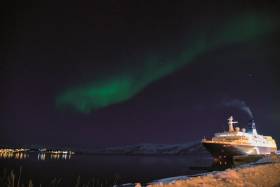Displaying items by tag: WhaleWatch Cruise
Whale-Watching Season Begins With St. Valentine's Cruise to 'Northern Lights' in Norway
#CruiseLiners - On this Valentine’s Day the yacht-like cruiseship Saga Pearl II is due to depart Portsmouth International Port (PIP) at 17.00 this afternoon to see the Northern Lights in Norway. It won’t just be guests on board hoping to see incredible sights.
According to PIP, a team from ORCA, a marine conservation charity based in the UK's second busiest ferryport, will also be joining the crew of the Saga Cruises ship on the 15 night holiday. It will be the first survey of 2018 for ORCA, one of eleven journeys they will be making from Portsmouth with Saga this year to learn more about marine mammals and habitats in which they live.
The cruise from the historic maritime city of Portsmouth explores Norway's coastal waters and heads into the Arctic Circle. Last year's cruises to the same area saw everything from humpback whales to harbour porpoises, and sperm whales to pilot whales.
ORCA has also just announced it is to partner with another cruise ship operator at Portsmouth. Noble Caledonia specialises in small cruise ship holidays accessing incredible natural habitats that larger vessels can’t visit. A “unique and innovative marriage” between the charity and Noble Caledonia is expected to expand a citizen’s science programme onboard the small luxury liners.
Tim Cochrane, Noble Caledonia Managing Director, said “I am delighted to be able to introduce this concept into our expedition tours and to be working with ORCA: I know that our guests will relish being part of this exciting initiative as part of their holiday with us such that they can take away even more than the lasting memories our holidays provide. The opportunity to join in with some of the scientific research being undertaken by our knowledgeable and experienced expedition team members, many of whom are experts in their own fields, will, I am sure, enhance guest experience on our expedition tours”.
Saga Pearl II is the smallest of the operator's fleet and as Afloat reported the intimate 449 passenger cruiseship has in recent years called to Warrenpoint, where there are plans to boost cruise tourism.





























































